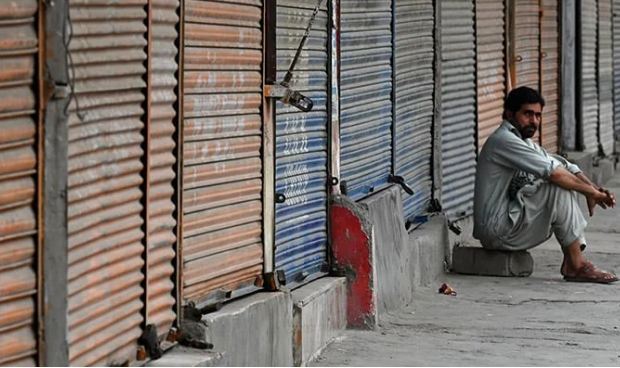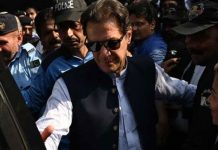“[We] reject the hike in taxes and electricity bills,” says Sindh president of All Pakistan Anjuman-e-Tajiran
Staff Report
ISLAMABAD/LAHORE/KARACHI: To protest against the government’s tax reforms, traders across the country are observing a nationwide strike on Wednesday with support from traders associations and political parties.
The political parties throwing weight behind the traders include Jamiat Ulema-e-Islam Fazl (JUI-F), Pakistan Tehreek-e-Insaf (PTI), Jamaat-e-Islami (JI) and Awami National Party (ANP).
Ahead of the countrywide strike, Anjuman-e-Tajiran Karachi had announced a complete closure of business today.
“The political leadership has failed,” said Javed Shams, the president of the All Pakistan Anjuman-e-Tajiran’s Sindh chapter, announcing his support for the nationwide strike.
Shams added that all business will be completely closed today in all small and big cities of Sindh. “[We] reject the hike in taxes and electricity bills.”
He added that the ruling class wants to take away the right to live from the business class and the people, insisting that the “Trader Friendly Scheme” is not acceptable in its current form.
The Karachi Electronics Dealers Association has also backed the strike call. KEDA President Mohammad Rizwan said all trade unions from Karachi to Khyber are participating in the strike.
“If the issues are not resolved, the duration of the strike may increase,” said Rizwan.
All Karachi Traders Union President Atiq Mir termed the strike as one of the citizens and not traders. “The common man is worried about inflation.”
Reacting to the countrywide strike, Coordinator to Prime Minister of Pakistan on Implementation and Monitoring, Rana Ihsaan Afzal Khan, said the government will not be pressured by traders.
Speaking during Geo News programme “Geo Pakistan”, Khan invited the traders for talks if they considered the government’s “wrong”.
He added that Prime Minister Shehbaz Sharif has reorganised the Federal Board of Revenue (FBR), insisting that the retail sector must also come under the tax net.
Meanwhile in Punjab, cities including Vehari, all business centres are closed following the call of nationwide strike by the Central Traders Association of Pakistan with all markets including those at the Club Road, Jinnah Road, Luddun Road, Rail Bazaar, Choori Bazar and Multan Road completely closed.
The president of the association, supporting the call, said that the government has imposed “cruel taxes” on the traders.
In Gujranwala, all small and major markets in the cities’ inner parts including Cloth Market, Steel Market and Sanitary Market, as well as those in the Satellite Town will be closed. The city’s mobile phone association has also endorsed the call for strike.
In Khyber Pakhtunkhwa’s Peshawar, traders’ organisations are observing the strike, as various markets remain shut across the city with trade unions demanding the withdrawal of the hike in power bills and reduction in tax rates.
All markets including Sadar Bazaar, Shafi Market, Qisa Khwani and Khyber Bazaar have been shut, while traders organisations have set up protest camps in front of the closed markets.
In Dera Ismail Khan, traders are observing a complete strike with all commercial centers closed following support from traders’ association, traders’ union and traders’ action committee.
Traders across cities in Sindh — including Nawabshah, Tando Allahyar, Thatta, Sajawal, and others — are also striking with central commercial areas as well as small- and large-scale businesses shut in adhere with the strike.
“Monthly tax, withholding tax, professional tax are anti-business policies,” said Sindh Traders Association President Waqar Memon.
Markets and commercial centres in Punjab cities including Chichawatani are closed following the strike with traders demanding the government to withdraw “cruel” taxes and reduction in electricity cost.
On the other hand, JI in Charsadda have also called for the traders’ strike, as all food shops including hotels remain closed.
Addressing a presser in Karachi today, JI Spokesperson Qaisar Sharif said that all traders and industrialists support the party’s call for a strike.
“The public has rejected the government’s attempts to stop the strike. If the problems are not resolved, a future action plan will be presented after consultation with traders and industrial organisations,” the spokesperson added.
Qaisar insisted that the government end the unfair contracts with IPPs and immediately implement the agreement made with JI. “Jamaat-e-Islami will not back down from its demands without providing relief to the people.”
In Lahore, JI and traders’ organisations are observing the strike as most markets and businesses of the city remain closed for the day.
All small and big markets as well as shops including bakeries, ovens, hotels, general stores also remain shut on the appeal of traders in Rawalpindi, where the business community and trade associations including the city’s Oil Tanker Association have extended their support for the strike.
A strike was also observed in other cities of Punjab such as Rahim Yar Khan, Dera Ghazi Khan, Rajanpur, Cheechawatani, Sargodha, Choonian, Taxila, Chakwal, Patoki, Changa Manga and Arifwala.
In Balochistan, too, traders have kept their shops and business closed in protest across cities including Quetta, Hub, Harnai and Mastung, among others.
Other KP cities observing the strike include Mansehra, Bajaur, Charsadda, Kirk, Bannu and Malakand.
Earlier this week, the religio-political party had announced to observe a shutter-down strike across the country on August 28 (today) to mount pressure on the coalition government to provide relief to the masses.
The announcement came after the party postponed its 14-day long sit-in on August 9 following successful negotiations with the government over demands including slashing high power tariffs and reviewing agreements with the Independent Power Producers which have been under the spotlight as people are paying hefty bills blamed on capacity payments being made to independent power producers.

















